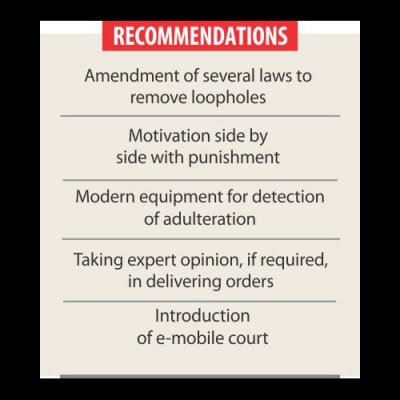More power sought for mobile courts

Judicial powers of mobile courts should be increased by amending several relevant laws to effectively maintain law and order, check crimes and safeguard public interest, a number of executive magistrates and their superiors said yesterday.
Some of the laws have ambiguities and shortcomings which should be addressed to make mobile courts more effective, they said.
The admin officials came up with the suggestions at a daylong workshop titled “Mobile Court Conduct: Public Security and Social Crimes Control” at the capital's Biam auditorium.
The Cabinet Division in association with Dhaka Divisional Commissioner's Office organised the programme around a couple of months after it asked the home ministry to take initiatives to amend a dozen laws concerning mobile courts.
Mobile courts now operate under the Mobile Court Act 2009 and follow more than a hundred laws. A mobile court can sentence an offender up to two years in prison and slap a fine on him under the act.
In the first week of April, the Cabinet Division wrote to the home ministry, asking it to take steps to amend Electricity Act 1910, Railways Act 1890, Cinema Act 1918, Motor Vehicles Ordinance 1983, Touts Act 1879, Public Gambling Act 1867, Control of Essential Commodities Act 1956, Building Construction Act 1952, Places of Public Amusement Act 1933, Child Marriage Restraint Act 1929, Passport Act 1920 and Forest Act 1927.
It said the laws needed to be amended as mobile courts could not fine or sentence many offenders due to loopholes in these laws.
The home ministry has already made a move to this end.
Yesterday's workshop was attended by more than 150 executive magistrates, current and former secretaries, additional and joint secretaries, divisional commissioners and deputy commissioners.
The admin officials demanded that mobile courts be equipped with state-of-the-art technology for detecting adulteration in food items and essential commodities. They also raised the demand for launching e-mobile courts for monitoring online contents.
“Laws should be amended to make mobile courts more effective,” said Cabinet Secretary Mohammad Shafiul Alam, adding that the workshop was organised to take opinions of all the people concerned.
Globally, mobile court is a tested tool for safeguarding public interest, he said.
If spot trial is conducted rightly, the number of cases at traditional courts would come down significantly, said Shafiul.
Mobile courts have long been helping maintain law and order and protect public interest in different formats, he said.
Shafiul noted that the judiciary and the executive branches of the state are not each other's opponent, and both are accountable to the people.
Public confidence in mobile courts has increased a lot after the passage of the Mobile Court Act 2009 under which executive magistrates have been sentencing offenders through summary trial, he added.
Md Shahidul Haque, secretary to the legislative and parliamentary affairs division of the law ministry, also put emphasis on amending the relevant laws.
Smriti Rani Gharami, additional secretary of the home ministry, said the ministry had already taken an initiative to amend the Mobile Court Act.
The proposals are now lying with the law ministry. Once the ministry completes vetting, those would be placed before the cabinet, said Smriti.
If the proposed amendments are approved, mobile courts would be equipped with state-of-the-art devices and be able to take opinions from experts in delivering orders, she said.
If businesses are found selling adulterated foods and goods, they should be shut down and their licences cancelled to make sure that they cannot commit the same offence again, she said.
In his speech, Md Mozammel Haque Khan, senior secretary of the home ministry, said mobile courts had already become popular and effective in checking food adulteration, drug peddling, environmental pollution and social crimes.
Presenting the keynote paper at the workshop, Md Shujayet Ullah, joint secretary of the expatriates welfare and overseas employment ministry, pointed out some guidelines for magistrates.
The suggestions include conducting search on a person on suspicion following the CrPC rules and ensuring that no innocent person is harassed by a mobile court.
He urged magistrates to resist attempts from powerful quarters to interfere in prosecuting anyone.
Unjustified prosecution must be avoided to check abuse of power by magistrates, he added.
Shahida Ali, joint secretary of the Cabinet Division, said 147,754 people were sentenced and Tk 37.38 crore was realised in fine in mobile court drives last year. Besides, 1.37 lakh cases were resolved during the 57,157 drives.
Dhaka Divisional Commissioner Helal Uddin Ahmed presided over the workshop.
It was address by former cabinet secretary Ali Imam Majumder, former secretary Shahjahan Ali Mollah, Biam Foundation Director General Nurul Islam, Additional District Magistrate of Narsingdi Muhammad Rehan Uddin, and Bangladesh Public Administration Training Centre Director AHM Anwar Pasha, DPDC Secretary Mohammad Munir Chowdhury and deputy commissioners of several districts.

 For all latest news, follow The Daily Star's Google News channel.
For all latest news, follow The Daily Star's Google News channel. 



Comments